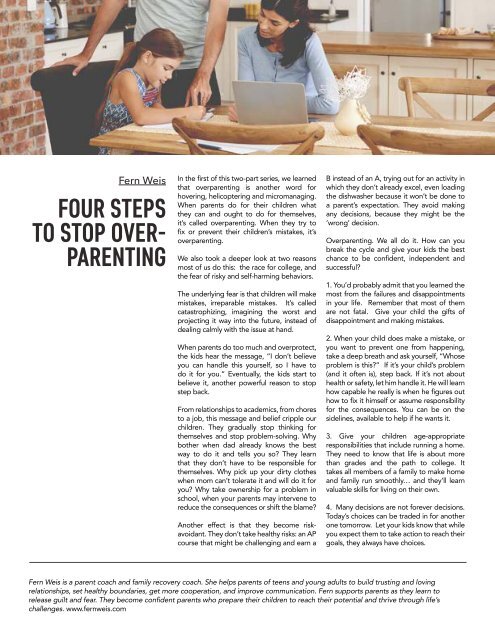24 Seven November 2017
Change Your Attitude… Change Your Life: 24/seven is a monthly, free magazine for personal growth, professional development, and self-empowerment. The approach is holistic, incorporating mind, body, soul, and spirit. As philosopher Francis Bacon said, “Knowledge is power.” Use this information to live your best life now.
Change Your Attitude… Change Your Life: 24/seven is a monthly, free magazine for personal growth, professional development, and self-empowerment. The approach is holistic, incorporating mind, body, soul, and spirit. As philosopher Francis Bacon said, “Knowledge is power.” Use this information to live your best life now.
You also want an ePaper? Increase the reach of your titles
YUMPU automatically turns print PDFs into web optimized ePapers that Google loves.
Fern Weis<br />
FOUR STEPS<br />
TO STOP OVER-<br />
PARENTING<br />
In the first of this two-part series, we learned<br />
that overparenting is another word for<br />
hovering, helicoptering and micromanaging.<br />
When parents do for their children what<br />
they can and ought to do for themselves,<br />
it’s called overparenting. When they try to<br />
fix or prevent their children’s mistakes, it’s<br />
overparenting.<br />
We also took a deeper look at two reasons<br />
most of us do this: the race for college, and<br />
the fear of risky and self-harming behaviors.<br />
The underlying fear is that children will make<br />
mistakes, irreparable mistakes. It’s called<br />
catastrophizing, imagining the worst and<br />
projecting it way into the future, instead of<br />
dealing calmly with the issue at hand.<br />
When parents do too much and overprotect,<br />
the kids hear the message, “I don’t believe<br />
you can handle this yourself, so I have to<br />
do it for you.” Eventually, the kids start to<br />
believe it, another powerful reason to stop<br />
step back.<br />
From relationships to academics, from chores<br />
to a job, this message and belief cripple our<br />
children. They gradually stop thinking for<br />
themselves and stop problem-solving. Why<br />
bother when dad already knows the best<br />
way to do it and tells you so? They learn<br />
that they don’t have to be responsible for<br />
themselves. Why pick up your dirty clothes<br />
when mom can’t tolerate it and will do it for<br />
you? Why take ownership for a problem in<br />
school, when your parents may intervene to<br />
reduce the consequences or shift the blame?<br />
Another effect is that they become riskavoidant.<br />
They don’t take healthy risks: an AP<br />
course that might be challenging and earn a<br />
B instead of an A, trying out for an activity in<br />
which they don’t already excel, even loading<br />
the dishwasher because it won’t be done to<br />
a parent’s expectation. They avoid making<br />
any decisions, because they might be the<br />
‘wrong’ decision.<br />
Overparenting. We all do it. How can you<br />
break the cycle and give your kids the best<br />
chance to be confident, independent and<br />
successful?<br />
1. You’d probably admit that you learned the<br />
most from the failures and disappointments<br />
in your life. Remember that most of them<br />
are not fatal. Give your child the gifts of<br />
disappointment and making mistakes.<br />
2. When your child does make a mistake, or<br />
you want to prevent one from happening,<br />
take a deep breath and ask yourself, “Whose<br />
problem is this?” If it’s your child’s problem<br />
(and it often is), step back. If it’s not about<br />
health or safety, let him handle it. He will learn<br />
how capable he really is when he figures out<br />
how to fix it himself or assume responsibility<br />
for the consequences. You can be on the<br />
sidelines, available to help if he wants it.<br />
3. Give your children age-appropriate<br />
responsibilities that include running a home.<br />
They need to know that life is about more<br />
than grades and the path to college. It<br />
takes all members of a family to make home<br />
and family run smoothly… and they’ll learn<br />
valuable skills for living on their own.<br />
4. Many decisions are not forever decisions.<br />
Today’s choices can be traded in for another<br />
one tomorrow. Let your kids know that while<br />
you expect them to take action to reach their<br />
goals, they always have choices.<br />
Fern Weis is a parent coach and family recovery coach. She helps parents of teens and young adults to build trusting and loving<br />
relationships, set healthy boundaries, get more cooperation, and improve communication. Fern supports parents as they learn to<br />
release guilt and fear. They become confident parents who prepare their children to reach their potential and thrive through life’s<br />
challenges. www.fernweis.com


















